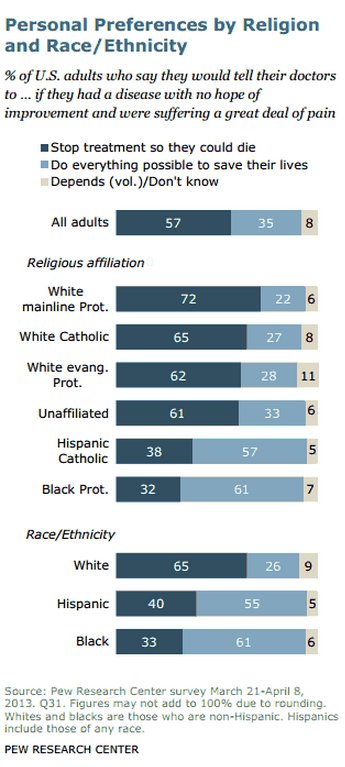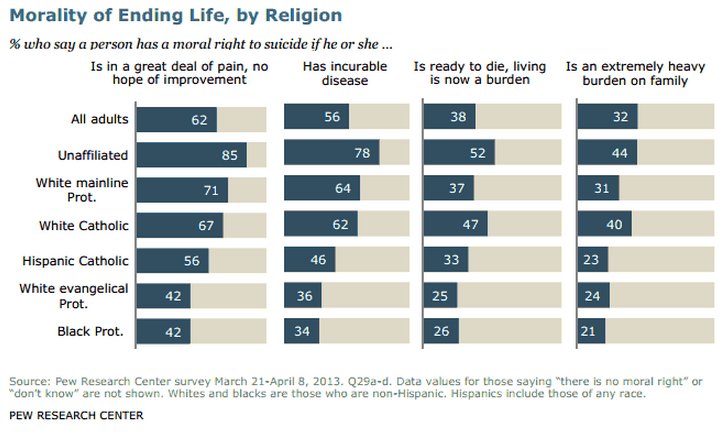Perhaps they are not the stars, but rather openings in Heaven where the love of our lost ones pours through and shines down upon us to let us know they are happy.
Author Unknown
Happy New Year!

Inner Peace

American Attitudes Towards Death: 12 Facts From New Pew Research Center Survey
Pew Research Center‘s new report, “Americans’ Views on End-of-Life Medical Treatment,” explores the individual preferences and choices that surround the universal experience of death.
However, starting the conversation about the end of life is not always easy, and a large chunk of U.S. adults haven’t given much thought to their preferences at all.
But discussing death doesn’t have to be morbid. In fact, it’s often an excellent idea to talk about preferences before it’s necessary. That’s the idea behind “Death Over Dinner,” which are meals organized in order to connect friends and strangers through conversations about life and death.
Laura Sweet, a former hospice volunteer and a “Death Over Dinner” host, says, “We want to talk in an informal way about personal experiences with death. How do people want to die? Have you shared that with anyone? What deaths have you experienced? We don’t want it to be distasteful, or uncomfortable, but an uplifting atmosphere.”
These facts drawn from the Pew survey about American attitudes towards death show the importance of thinking about the end of life, and communicating with loved ones about preferences.
1. America’s elderly population has more than tripled in size over the last century
The share of the total U.S. population that is age 65 and older has more than tripled over the last century, from roughly 4% in 1900 to 14% in 2012.

2. Over a quarter of U.S. adults haven’t really thought about future medical treatment at the end of their lives
Fully a quarter of adults (27%) say that they have not given very much thought or have given no thought at all to how they would like doctors and other medical professionals to handle their medical treatment at the end of their lives, even those aged 75 or older (25%).

3. Most Americans are expected to live well into their seventies
The average life expectancy in the U.S. is now 78.7 years.

4. The majority of U.S. adults would want to stop medical treatment if they were suffering a lot of pain with dire hope for improvement
57% of adults say that they would tell their doctors to stop treatment if they had an incurable disease with no hope of improvement and were suffering a great deal of pain.

5. About one third of Americans would fight for life no matter what
About a third of adults (35%) say they would tell their doctors to do anything possible to keep them alive, even if the circumstances were so dire that they had a disease with no hope of improvement and were experiencing a great deal of pain.

6. A majority of adults believe in a moral right to suicide, if a person was in great pain with no hope of getting better
62% of adults say that a person suffering a great deal of pain with no hope of improvement has a moral right to commit suicide.

7. There is a big split on the issue of the legitimacy of physician-assisted suicide
47% of adults approve of laws to allow doctor-assisted suicide for terminally ill patients, while 49% disapprove.

8. Race greatly affects the answers of whether people would want to fight to stay alive in great pain and little hope of improvement
Only 26% of white U.S. adults would ask their doctors to do everything possible to save their lives if they had a disease with no hope of improvement and were suffering a great deal of pain, in stark contrast with the 61% of black adults and 55% of Hispanic adults who would want the maximum effort expended on life-saving strategies.

9. Death has affected most people in the United States
About half of adults (47%) say they have a friend or relative who has had a terminal illness or who has been a coma within the last five years.

10. A majority of U.S. adults believe that an infant should receive as much treatment as possible in the case of a life-threatening birth defect, even if parents want to refuse treatment
38% of adults believe that a parent has a right to refuse treatment on behalf of an infant in the case of a life-threatening birth defect, while 57% say that an infant should receive as much treatment as possible, regardless of the defect.

11. Religion and race greatly affect people’s response to the idea of a moral right to suicide in case of great pain
Black Protestants are most inclined to reject the idea of a moral right to suicide, out of the religious and racial groups surveyed. Religiously unaffiliated adults were most likely to support a moral right to suicide.

12. Optimism for the future is harder to find in the older generation
Only about a fifth (19%) of adults aged 75 and older expect their lives to be better in ten years compared with today, though 71% of people aged 18-49 believe that their life will improve in the future.

Pew Research Center first surveyed American attitudes about death in 1990, then again in 2005. This survey was conducted by telephone with a national sample of adults, 18 years of age or older, living in all fifty U.S. states as well as the District of Columbia. 1,994 interviews were conducted in English and Spanish from March 21 to April 8, 2013. The margin of error for the entire sample is ±2.9 percentage points.
Note: In headlines, ‘Americans’ and ‘U.S. adults’ are sometimes used interchangeably for the sake of flow.
The Huffington Post | By Yasmine Hafiz Posted: 11/21/2013 12:11 pm EST | Updated: 11/21/2013 12:24 pm EST
Nurse Discusses 5 Regrets People Tell Her Before They Die
Interesting Read: Will you be someone with regret when its to late to change things?
For many years I worked in palliative care. My patients were those who had gone home to die. Some incredibly special times were shared. I was with them for the last three to twelve weeks of their lives. People grow a lot when they are faced with their own mortality.
I learnt never to underestimate someone’s capacity for growth. Some changes were phenomenal. Each experienced a variety of emotions, as expected, denial, fear, anger, remorse, more denial and eventually acceptance. Every single patient found their peace before they departed though, every one of them.
When questioned about any regrets they had or anything they would do differently, common themes surfaced again and again. Here are the most common five:
1. I wish I’d had the courage to live a life true to myself, not the life others expected of me.
This was the most common regret of all. When people realize that their life is almost over and look back clearly on it, it is easy to see how many dreams have gone unfulfilled. Most people had not honoured even a half of their dreams and had to die knowing that it was due to choices they had made, or not made.
It is very important to try and honour at least some of your dreams along the way. From the moment that you lose your health, it is too late. Health brings a freedom very few realise, until they no longer have it.
2. I wish I didn’t work so hard.
This came from every male patient that I nursed. They missed their children’s youth and their partner’s companionship. Women also spoke of this regret. But as most were from an older generation, many of the female patients had not been breadwinners. All of the men I nursed deeply regretted spending so much of their lives on the treadmill of a work existence.
By simplifying your lifestyle and making conscious choices along the way, it is possible to not need the income that you think you do. And by creating more space in your life, you become happier and more open to new opportunities, ones more suited to your new lifestyle.
3. I wish I’d had the courage to express my feelings.
Many people suppressed their feelings in order to keep peace with others. As a result, they settled for a mediocre existence and never became who they were truly capable of becoming. Manydeveloped illnesses relating to the bitterness and resentment they carried as a result.
We cannot control the reactions of others. However, although people may initially react when you change the way you are by speaking honestly, in the end it raises the relationship to a whole new and healthier level. Either that or it releases the unhealthy relationship from your life. Either way,you win.
4. I wish I had stayed in touch with my friends.
Often they would not truly realise the full benefits of old friends until their dying weeks and it was not always possible to track them down. Many had become so caught up in their own lives that they had let golden friendships slip by over the years. There were many deep regrets about not giving friendships the time and effort that they deserved. Everyone misses their friends when they are dying.
It is common for anyone in a busy lifestyle to let friendships slip. But when you are faced with your approaching death, the physical details of life fall away. People do want to get their financial affairs in order if possible. But it is not money or status that holds the true importance for them. They want to get things in order more for the benefit of those they love. Usually though, they are too ill and weary to ever manage this task. It is all comes down to love and relationships in the end. That is all that remains in the final weeks, love and relationships.
5. I wish that I had let myself be happier.
This is a surprisingly common one. Many did not realise until the end that happiness is a choice. They had stayed stuck in old patterns and habits. The so-called ‘comfort’ of familiarity overflowed into their emotions, as well as their physical lives. Fear of change had them pretending to others, and to their selves, that they were content. When deep within, they longed to laugh properly and have silliness in their life again. When you are on your deathbed, what others think of you is a long way from your mind. How wonderful to be able to let go and smile again, long before you are dying.
Source: karenstan.net/2013/11/11/nurse-reveals-top-5-regrets-people-make-deathbed/
Dealing with Grief
In Chinese medicine, the element associated with autumn is Metal. Grief is the challenging emotion of the Metal element and its lesson is learning to let go. Grief is a cleansing period as we move away from things that are no longer in our lives. It is the transition between what was (or what could have been) and what is. A blockage or imbalance of the energy of Metal can cause our expression of grief to become imbalanced and inappropriate. For some, it may be excessive and ongoing expelling of emotion, for others it may be that they cannot express their grief. In both cases, imbalances of grief often lead to feelings of anxiety and detachment, or a sense of being overwhelmed.
Suggestions for moving forward:
DECLUTTER Go through your closet, desk, garage, medicine cabinet – any cluttered storage area-and discard what you no longer need. Then donate, sell, or otherwise circulate what might be of value to others.
REFLECT Take a mental inventory: Examine attitudes (prejudices, envies, hatreds, jealousies, resentments) stored within your psyche. When possible, contact those with whom you harbor old “stuff.” Attempt to resolve the hurtful old issues, and then let them go.
RELEASE For issues you cannot resolve directly with others, or for old issues with yourself, write them on paper, being as specific as possible. Then burn the paper, symbolically releasing the content.
BREATHE Take time each day to breathe slowly and deeply. As you inhale the clean autumn air, feel yourself energized and purified. Feel the old negativity, impurity, and pain leave your body and psyche. Then contemplate briefly who you are without these identifications.
Written by: Courtney Burbela for Cornerstone Healing
How to Close a Facebook Account After Death
How to Close a Facebook Account When Someone Dies
If someone close to you dies, and they have a Facebook account, there are two basic ways to close their account. First, if you know their username and password, you can log into Facebook, use the account settings, and queue the Facebook account for deletion. After 14 days, the account will be closed, provided no one logs into the account during the waiting period. If someone logs into the account during the 14-day delete queue, the account deletion must start all over again.
Try to let friends and group members on Facebook know that the account owner is deceased, and then queue the account for deletion. Don’t leave people wondering what happened.
The next way to delete am account with Facebook when someone has died is the method you can use when you don’t know the username and/or password for the Facebook account.
Memorialize the Account: Facebook, at this link here, has a policy that allows you to report that a person is dead. When you file that report, it freezes their account. That is, it removes any privacy-related issues (phone numbers, etc) and stops allowing friend requests. All other information stays the same. This is for people who want to keep an account open in memorial to the deceased, allowing only friends who were approved prior to the death to see the page. It also removes the page from generic search results.
Remove the Account: Facebook will remove the account of a user who is confirmed dead, should the family or next of kin not want the account memorialized. The next of kin or the person who has power of attorney or legal power due to being executor of the decedent’s estate can send a copy of a death certificate along with the deceased’s account information, and the account will then be investigated and removed.
Make it Easy on Friends and Family: Have a Will
There are many online services now that allow people to register an account, and safely store all their passwords, account information and more so that when they die, a copy of a death certificate to that company will allow all the information to be released to the next of kin or estate executor. If you have multiple online accounts where you are prolific or known by your friends, it’s the right and responsible thing to do to make sure your online friends are notified of your death and your accounts are handled the way YOU want them to be handled.
The point here is: if you don’t want your accounts removed, tell your family members and include it in your will. If you do want them removed, that needs to be included too, along with information on how to access the accounts to remove them.
Yahoo Contributor Network, Md Lynn
August is Make-A-Will Month
It’s time to protect yourself and your family’s future!
No need to hire an attorney you can search on line and do it yourself. There is no time like the present.
Who Pays Your Credit Card Debt When You Die?
By Aaron Crowe | Credit.com
Paying the debts of a relative who recently died might feel like a moral obligation, but whether it’s a legal one may not immediately be clear.
Dealing with a loved one’s credit card debt has a few twists to it, but in general these debts are not the responsibility of any heirs and require the credit card company to make a claim, according to several lawyers and financial experts.
In short, the debts of the deceased are the responsibility of the estate, and are first deducted from the estate’s assets before being distributed based on priority, says Michael Duffy, a lawyer in Philadelphia. However, if there are no assets or the debts exceed the assets, the outstanding debt is “written off” by the creditors, Duffy says.
There are exceptions, but relatives are protected from creditors by the federal Fair Debt Collection Practices Act, or FDCPA. The law has severe penalties for violations, and relatives who are being tracked down by creditors should contact an attorney, he suggests.
“They are already suffering the loss of a relative and they do not need unlawful harassment on top of it,” Duffy wrote in an email.
While creditors or collection agencies may call heirs, once they are given the contact information for the person handling the estate (such as a personal representative or executor), the calls to heirs must stop. In addition, lenders or collectors aren’t allowed to mislead debtors into thinking they have a legal responsibility for a debt when they don’t.
[Related Article: Negotiating With the IRS Just Got a Bit Easier]Who is LiableA wife, for example, isn’t responsible for the debt if the husband was listed as the only user. But if she was a joint account holder, says Wayne Sanford, a credit expert, she’s liable. If the spouse was only an authorized user, however, they are not liable for the debt.
When it comes to spouses, and who owes what, the issue can get confusing in community property states — where debts incurred after the marriage may be considered community property, even if only one spouse took out the loan. In these cases, it’s best to seek guidance from your attorney.
For some people, getting involved in a parent’s debt isn’t a choice they can avoid. Kryn Westhoven of New Jersey became an authorized user on his mom’s credit cards so he could help his mom handle her affairs before she died. The decision ultimately affected a home refinance two years after she died.
The credit card companies acknowledged that Westhoven wasn’t liable for his mother’s debt, but two still reported him to credit reporting agencies for having unpaid debts. This caused his credit score to drop and left him unable to refinance his home.
[Related Article: 8 Things Debt Collectors Won’t Tell You]Even for relatives who aren’t joint account holders or authorized users, they can still be liable if they used the deceased’s credit card. Donald A. DeLong, an attorney in Southfield, Mich., says he had a client who wasn’t a co-signer on a credit card she learned about — and used — after her husband died.She charged about $5,000 of his funeral expenses to his credit card and the credit card company sued her for the $25,000 owed on the card, taking the position that the spouse was liable for the entire amount of debt, DeLong says. He settled with the creditor for about $4,000, and his client had to deal with litigation for about a year and paid $2,000 in legal fees.
Who Gets Paid First?
If an estate goes into probate, which is the first step in the legal process of administering the estate of a deceased person, then the court will decide which creditors get paid before any heirs will receive an inheritance, says Jeffrey A. Field, a certified financial planner who practices in California and Utah.
In general, California law requires written “notice” to creditors when probate is opened, giving the creditor four months to make a claim. But credit cards are one of the last items to be paid from an estate, Field says. Other liabilities take priority, such as taxes, mortgages, Medicaid, administration expenses, and funeral expenses.
[Related Article: Will Banks Change Their Collection Methods?]Field recommends doing a few smart things if a relative dies with credit card debt: Cut up the cards and send them to the issuer with a statement of the date of death, and contact the three credit reporting bureaus — TransUnion, Equifax and Experian — informing them of the date of death and to close the credit profile. They should also check if there was insurance for the credit cards that would pay off the amount due at death, he says.If the deceased has an insurance policy, the proceeds are paid directly to the beneficiaries and not to the estate, says Thomas Simeone, an attorney in Washington, D.C. That can leave the beneficiaries with a sizable amount of money while leaving the credit card bill unpaid.
Who will be your Voice?
Did you know that by law when you check into a hospital they must ask do you have a health proxy and if you don’t you can request at no charge a patient relations specialists to help you fill one out. Ask them to make you copies and always bring it with you when checking into a hospital. Each State has a different form here is information from the Department of Health in New York State.
The New York Health Care Proxy Law allows you to appoint someone you trust — for example, a family member or close friend – to make health care decisions for you if you lose the ability to make decisions yourself. By appointing a health care agent, you can make sure that health care providers follow your wishes.
Everyone over the age of 18 needs to appoint a health care agent. There are two situations in which a health care agent will be needed:
- Temporary inability to make health care decisions – no matter what your age is. For example, you are having an outpatient surgical procedure and are under general anesthesia. Something unexpected happens and a health care decision needs to be made. If you have a health care agent, since you are temporarily unable to make your own decisions, the health care agent may make the decision. Once you become conscious again, the health care agent would no longer have any authority to act;
- Permanent inability to make health care decisions – this would arise if you were comatose from a terminal illness, in a persistent vegetative state, suffered from an illness that left you unable to communicate or, if elderly, suffered from senile dementia or Alzheimer’s disease. Under these circumstances you would obviously be unable to make your own health care decisions. If you don’t have a health care agent, all appropriate medical treatments will be provided to you. If you have appointed a health care agent, your health care agent can be your voice and make your health care decisions according to your own wishes, or your best interests.
Your agent can also decide how your wishes apply as your medical condition changes. Hospitals, doctors and other health care providers must follow your agent’s decisions as if they were your own. You may give the person you select as your health care agent as little or as much authority as you want. You may allow your agent to make all health care decisions or only certain ones. You may also give your agent instructions that he or she must follow. The Health Care Proxy Form may also be used to document your wishes or instructions with regard to organ and/or tissue donation.
Do not make this decision in hast but you can change your mind and redo the forms. Start the conversation now with the ones you love. Who will be your Voice?
